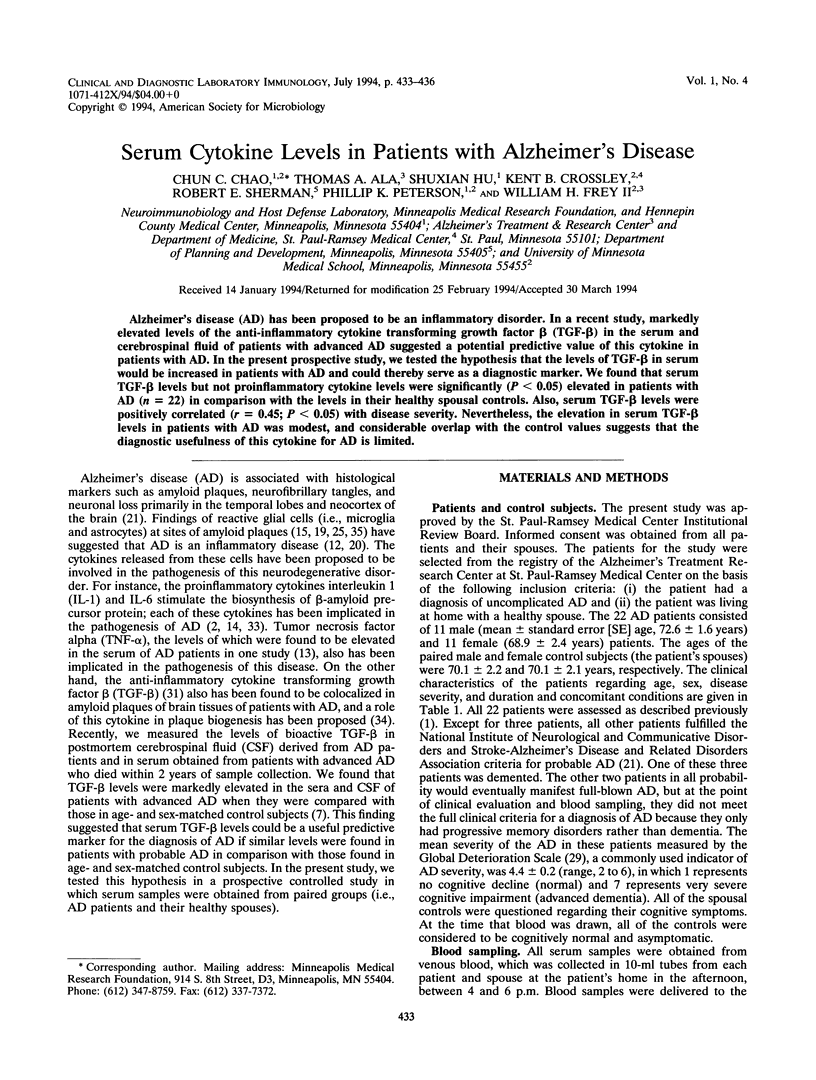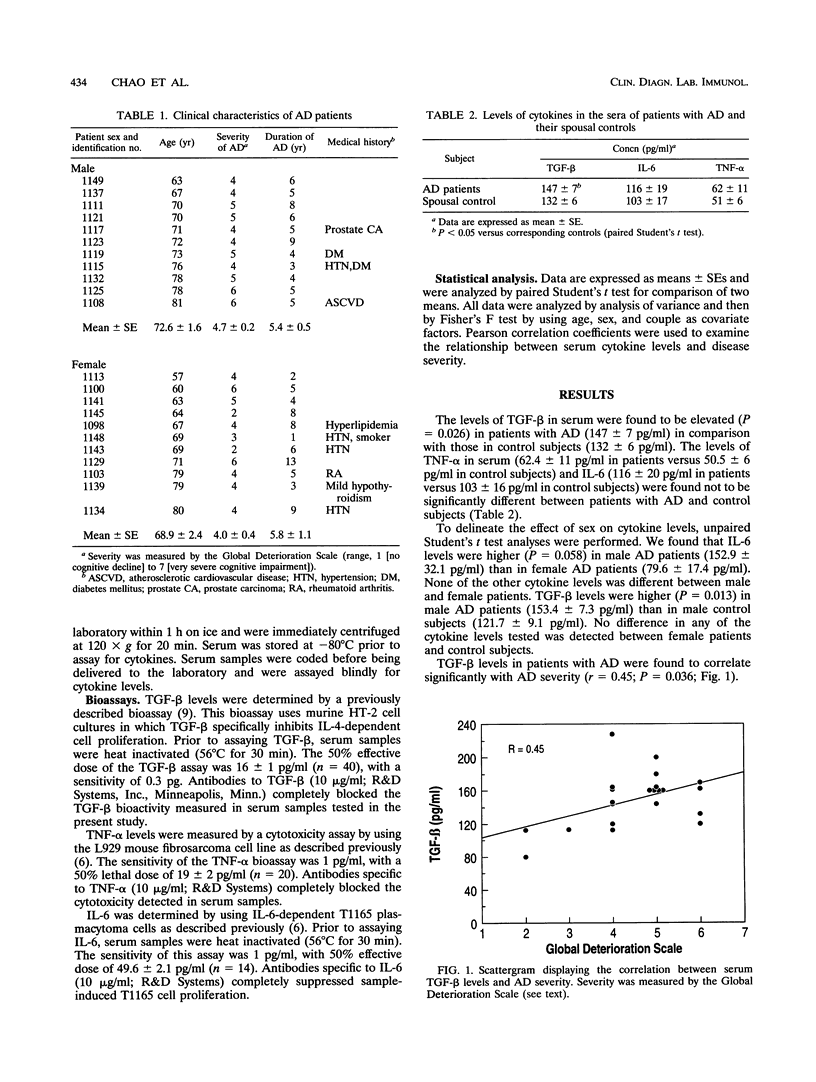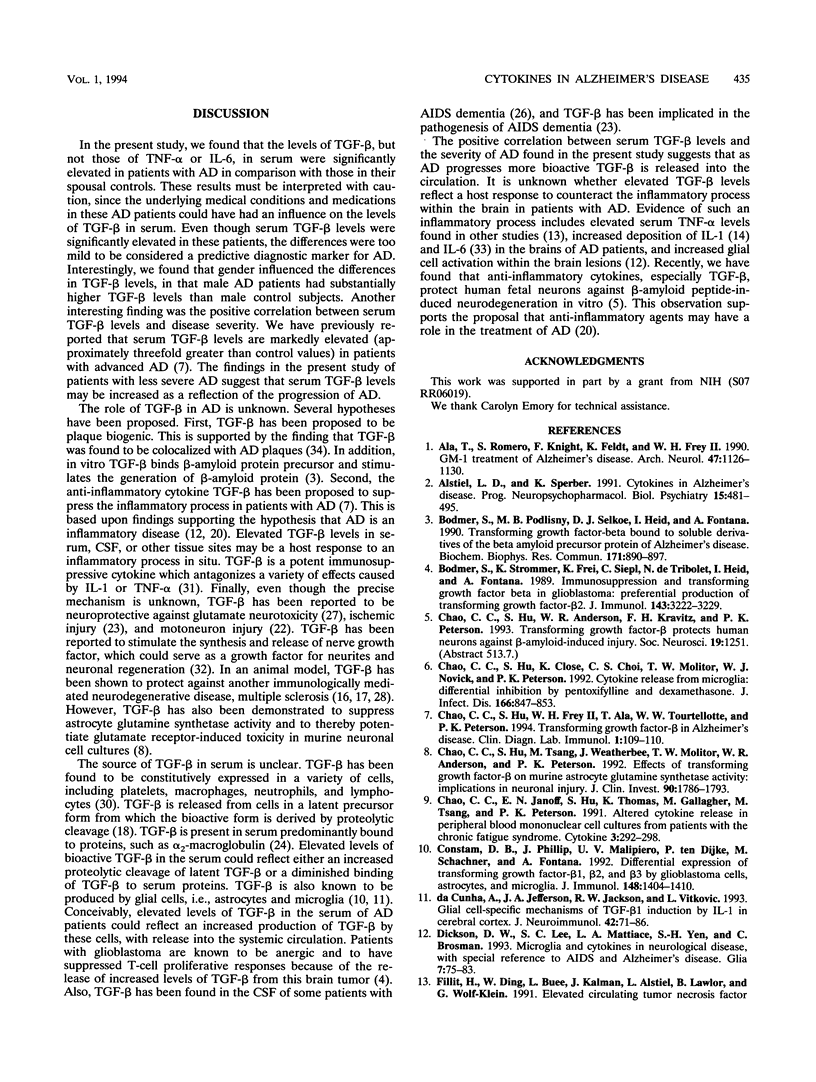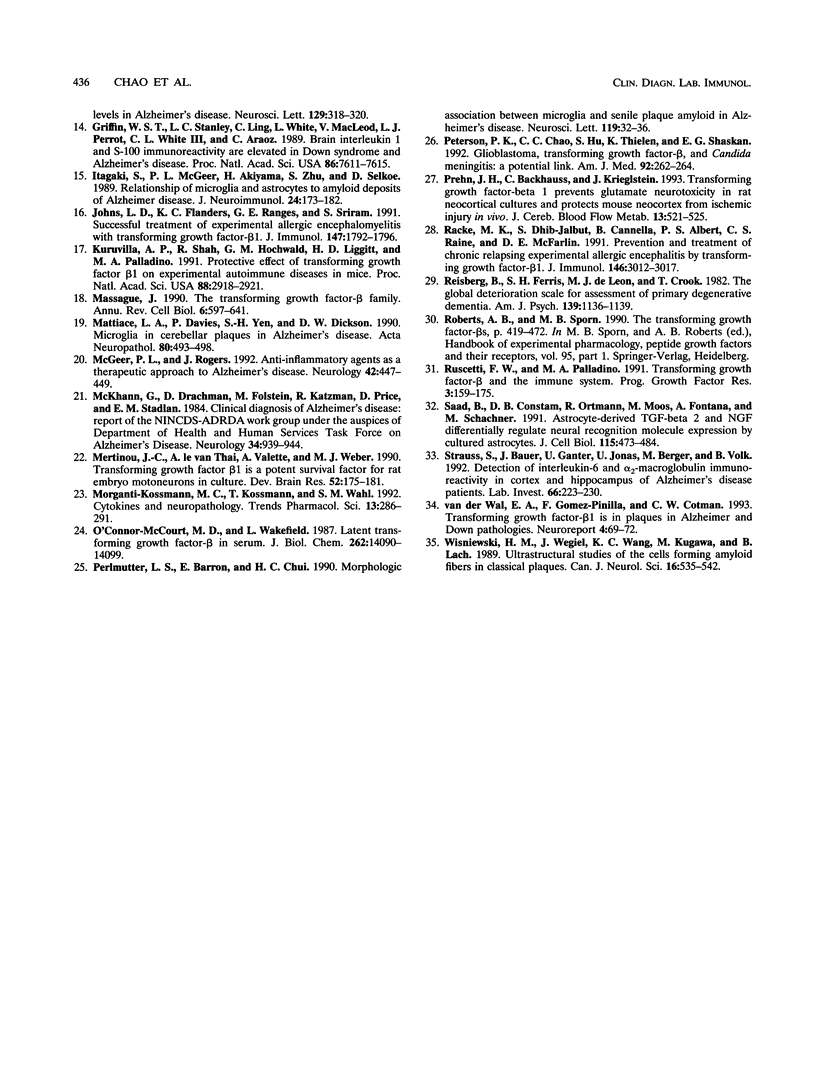Abstract
Alzheimer's disease (AD) has been proposed to be an inflammatory disorder. In a recent study, markedly elevated levels of the anti-inflammatory cytokine transforming growth factor beta (TGF-beta) in the serum and cerebrospinal fluid of patients with advanced AD suggested a potential predictive value of this cytokine in patients with AD. In the present prospective study, we tested the hypothesis that the levels of TGF-beta in serum would be increased in patients with AD and could thereby serve as a diagnostic marker. We found that serum TGF-beta levels but not proinflammatory cytokine levels were significantly (P < 0.05) elevated in patients with AD (n = 22) in comparison with the levels in their healthy spousal controls. Also, serum TGF-beta levels were positively correlated (r = 0.45; P < 0.05) with disease severity. Nevertheless, the elevation in serum TGF-beta levels in patients with Ad was modest, and considerable overlap with the control values suggests that the diagnostic usefulness of this cytokine for AD is limited.
Full text
PDF



Selected References
These references are in PubMed. This may not be the complete list of references from this article.
- Ala T., Romero S., Knight F., Feldt K., Frey W. H., 2nd GM-1 treatment of Alzheimer's disease. A pilot study of safety and efficacy. Arch Neurol. 1990 Oct;47(10):1126–1130. doi: 10.1001/archneur.1990.00530100096020. [DOI] [PubMed] [Google Scholar]
- Altstiel L. D., Sperber K. Cytokines in Alzheimer's disease. Prog Neuropsychopharmacol Biol Psychiatry. 1991;15(4):481–495. doi: 10.1016/0278-5846(91)90023-t. [DOI] [PubMed] [Google Scholar]
- Bodmer S., Podlisny M. B., Selkoe D. J., Heid I., Fontana A. Transforming growth factor-beta bound to soluble derivatives of the beta amyloid precursor protein of Alzheimer's disease. Biochem Biophys Res Commun. 1990 Sep 14;171(2):890–897. doi: 10.1016/0006-291x(90)91229-l. [DOI] [PubMed] [Google Scholar]
- Bodmer S., Strommer K., Frei K., Siepl C., de Tribolet N., Heid I., Fontana A. Immunosuppression and transforming growth factor-beta in glioblastoma. Preferential production of transforming growth factor-beta 2. J Immunol. 1989 Nov 15;143(10):3222–3229. [PubMed] [Google Scholar]
- Chao C. C., Hu S., Close K., Choi C. S., Molitor T. W., Novick W. J., Peterson P. K. Cytokine release from microglia: differential inhibition by pentoxifylline and dexamethasone. J Infect Dis. 1992 Oct;166(4):847–853. doi: 10.1093/infdis/166.4.847. [DOI] [PubMed] [Google Scholar]
- Chao C. C., Hu S., Frey W. H., 2nd, Ala T. A., Tourtellotte W. W., Peterson P. K. Transforming growth factor beta in Alzheimer's disease. Clin Diagn Lab Immunol. 1994 Jan;1(1):109–110. doi: 10.1128/cdli.1.1.109-110.1994. [DOI] [PMC free article] [PubMed] [Google Scholar]
- Chao C. C., Hu S., Tsang M., Weatherbee J., Molitor T. W., Anderson W. R., Peterson P. K. Effects of transforming growth factor-beta on murine astrocyte glutamine synthetase activity. Implications in neuronal injury. J Clin Invest. 1992 Nov;90(5):1786–1793. doi: 10.1172/JCI116053. [DOI] [PMC free article] [PubMed] [Google Scholar]
- Chao C. C., Janoff E. N., Hu S. X., Thomas K., Gallagher M., Tsang M., Peterson P. K. Altered cytokine release in peripheral blood mononuclear cell cultures from patients with the chronic fatigue syndrome. Cytokine. 1991 Jul;3(4):292–298. doi: 10.1016/1043-4666(91)90497-2. [DOI] [PubMed] [Google Scholar]
- Constam D. B., Philipp J., Malipiero U. V., ten Dijke P., Schachner M., Fontana A. Differential expression of transforming growth factor-beta 1, -beta 2, and -beta 3 by glioblastoma cells, astrocytes, and microglia. J Immunol. 1992 Mar 1;148(5):1404–1410. [PubMed] [Google Scholar]
- Dickson D. W., Lee S. C., Mattiace L. A., Yen S. H., Brosnan C. Microglia and cytokines in neurological disease, with special reference to AIDS and Alzheimer's disease. Glia. 1993 Jan;7(1):75–83. doi: 10.1002/glia.440070113. [DOI] [PubMed] [Google Scholar]
- Griffin W. S., Stanley L. C., Ling C., White L., MacLeod V., Perrot L. J., White C. L., 3rd, Araoz C. Brain interleukin 1 and S-100 immunoreactivity are elevated in Down syndrome and Alzheimer disease. Proc Natl Acad Sci U S A. 1989 Oct;86(19):7611–7615. doi: 10.1073/pnas.86.19.7611. [DOI] [PMC free article] [PubMed] [Google Scholar]
- Itagaki S., McGeer P. L., Akiyama H., Zhu S., Selkoe D. Relationship of microglia and astrocytes to amyloid deposits of Alzheimer disease. J Neuroimmunol. 1989 Oct;24(3):173–182. doi: 10.1016/0165-5728(89)90115-x. [DOI] [PubMed] [Google Scholar]
- Johns L. D., Flanders K. C., Ranges G. E., Sriram S. Successful treatment of experimental allergic encephalomyelitis with transforming growth factor-beta 1. J Immunol. 1991 Sep 15;147(6):1792–1796. [PubMed] [Google Scholar]
- Kuruvilla A. P., Shah R., Hochwald G. M., Liggitt H. D., Palladino M. A., Thorbecke G. J. Protective effect of transforming growth factor beta 1 on experimental autoimmune diseases in mice. Proc Natl Acad Sci U S A. 1991 Apr 1;88(7):2918–2921. doi: 10.1073/pnas.88.7.2918. [DOI] [PMC free article] [PubMed] [Google Scholar]
- Martinou J. C., Le Van Thai A., Valette A., Weber M. J. Transforming growth factor beta 1 is a potent survival factor for rat embryo motoneurons in culture. Brain Res Dev Brain Res. 1990 Mar 1;52(1-2):175–181. doi: 10.1016/0165-3806(90)90233-o. [DOI] [PubMed] [Google Scholar]
- Massagué J. The transforming growth factor-beta family. Annu Rev Cell Biol. 1990;6:597–641. doi: 10.1146/annurev.cb.06.110190.003121. [DOI] [PubMed] [Google Scholar]
- Mattiace L. A., Davies P., Yen S. H., Dickson D. W. Microglia in cerebellar plaques in Alzheimer's disease. Acta Neuropathol. 1990;80(5):493–498. doi: 10.1007/BF00294609. [DOI] [PubMed] [Google Scholar]
- McGeer P. L., Rogers J. Anti-inflammatory agents as a therapeutic approach to Alzheimer's disease. Neurology. 1992 Feb;42(2):447–449. doi: 10.1212/wnl.42.2.447. [DOI] [PubMed] [Google Scholar]
- McKhann G., Drachman D., Folstein M., Katzman R., Price D., Stadlan E. M. Clinical diagnosis of Alzheimer's disease: report of the NINCDS-ADRDA Work Group under the auspices of Department of Health and Human Services Task Force on Alzheimer's Disease. Neurology. 1984 Jul;34(7):939–944. doi: 10.1212/wnl.34.7.939. [DOI] [PubMed] [Google Scholar]
- Morganti-Kossmann M. C., Kossmann T., Wahl S. M. Cytokines and neuropathology. Trends Pharmacol Sci. 1992 Jul;13(7):286–291. doi: 10.1016/0165-6147(92)90087-m. [DOI] [PubMed] [Google Scholar]
- O'Connor-McCourt M. D., Wakefield L. M. Latent transforming growth factor-beta in serum. A specific complex with alpha 2-macroglobulin. J Biol Chem. 1987 Oct 15;262(29):14090–14099. [PubMed] [Google Scholar]
- Perlmutter L. S., Barron E., Chui H. C. Morphologic association between microglia and senile plaque amyloid in Alzheimer's disease. Neurosci Lett. 1990 Oct 30;119(1):32–36. doi: 10.1016/0304-3940(90)90748-x. [DOI] [PubMed] [Google Scholar]
- Peterson P. K., Chao C. C., Hu S., Thielen K., Shaskan E. G. Glioblastoma, transforming growth factor-beta, and Candida meningitis: a potential link. Am J Med. 1992 Mar;92(3):262–264. doi: 10.1016/0002-9343(92)90075-m. [DOI] [PubMed] [Google Scholar]
- Prehn J. H., Backhauss C., Krieglstein J. Transforming growth factor-beta 1 prevents glutamate neurotoxicity in rat neocortical cultures and protects mouse neocortex from ischemic injury in vivo. J Cereb Blood Flow Metab. 1993 May;13(3):521–525. doi: 10.1038/jcbfm.1993.67. [DOI] [PubMed] [Google Scholar]
- Racke M. K., Dhib-Jalbut S., Cannella B., Albert P. S., Raine C. S., McFarlin D. E. Prevention and treatment of chronic relapsing experimental allergic encephalomyelitis by transforming growth factor-beta 1. J Immunol. 1991 May 1;146(9):3012–3017. [PubMed] [Google Scholar]
- Reisberg B., Ferris S. H., de Leon M. J., Crook T. The Global Deterioration Scale for assessment of primary degenerative dementia. Am J Psychiatry. 1982 Sep;139(9):1136–1139. doi: 10.1176/ajp.139.9.1136. [DOI] [PubMed] [Google Scholar]
- Ruscetti F. W., Palladino M. A. Transforming growth factor-beta and the immune system. Prog Growth Factor Res. 1991;3(2):159–175. doi: 10.1016/s0955-2235(05)80006-7. [DOI] [PubMed] [Google Scholar]
- Saad B., Constam D. B., Ortmann R., Moos M., Fontana A., Schachner M. Astrocyte-derived TGF-beta 2 and NGF differentially regulate neural recognition molecule expression by cultured astrocytes. J Cell Biol. 1991 Oct;115(2):473–484. doi: 10.1083/jcb.115.2.473. [DOI] [PMC free article] [PubMed] [Google Scholar]
- Strauss S., Bauer J., Ganter U., Jonas U., Berger M., Volk B. Detection of interleukin-6 and alpha 2-macroglobulin immunoreactivity in cortex and hippocampus of Alzheimer's disease patients. Lab Invest. 1992 Feb;66(2):223–230. [PubMed] [Google Scholar]
- Wisniewski H. M., Wegiel J., Wang K. C., Kujawa M., Lach B. Ultrastructural studies of the cells forming amyloid fibers in classical plaques. Can J Neurol Sci. 1989 Nov;16(4 Suppl):535–542. doi: 10.1017/s0317167100029887. [DOI] [PubMed] [Google Scholar]
- van der Wal E. A., Gómez-Pinilla F., Cotman C. W. Transforming growth factor-beta 1 is in plaques in Alzheimer and Down pathologies. Neuroreport. 1993 Jan;4(1):69–72. doi: 10.1097/00001756-199301000-00018. [DOI] [PubMed] [Google Scholar]


